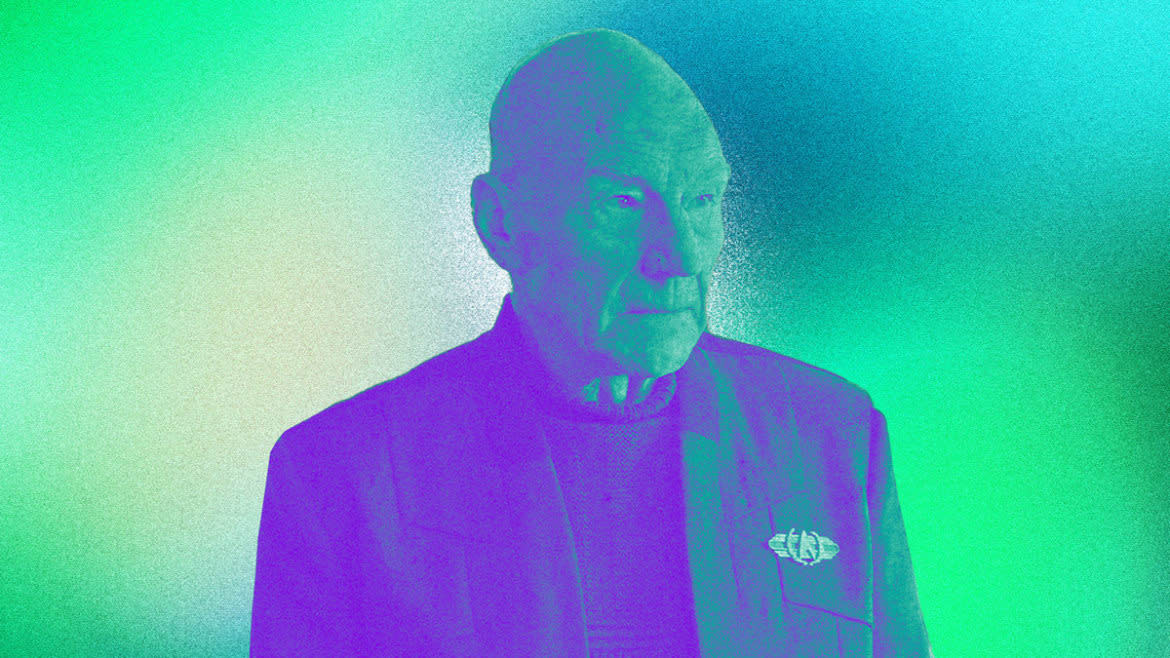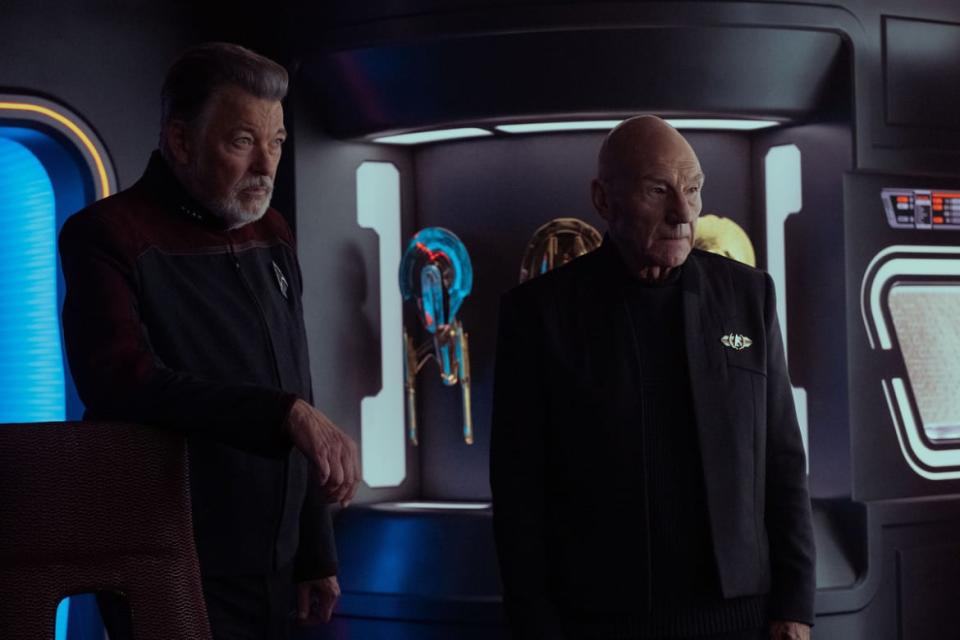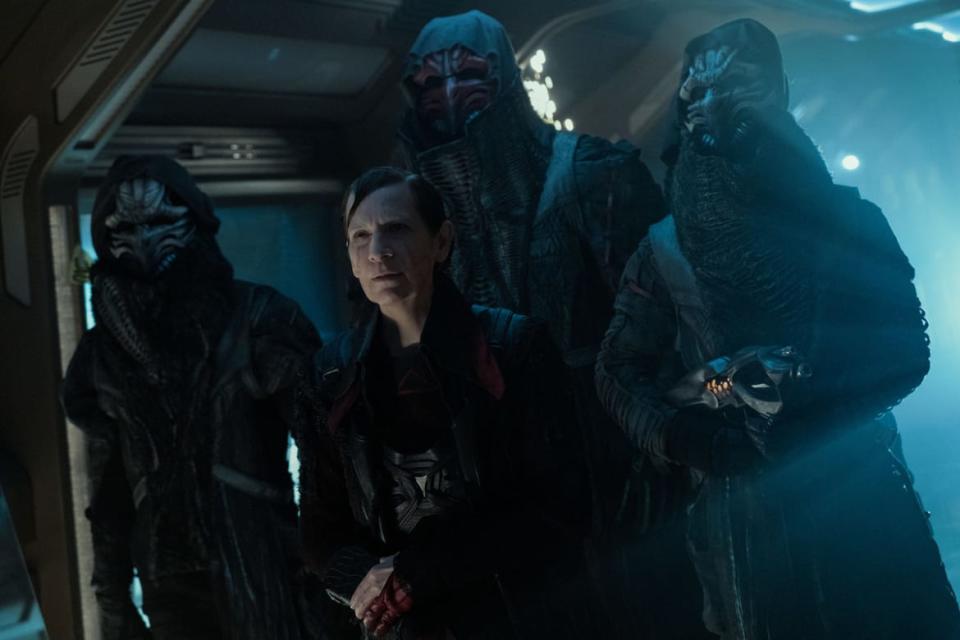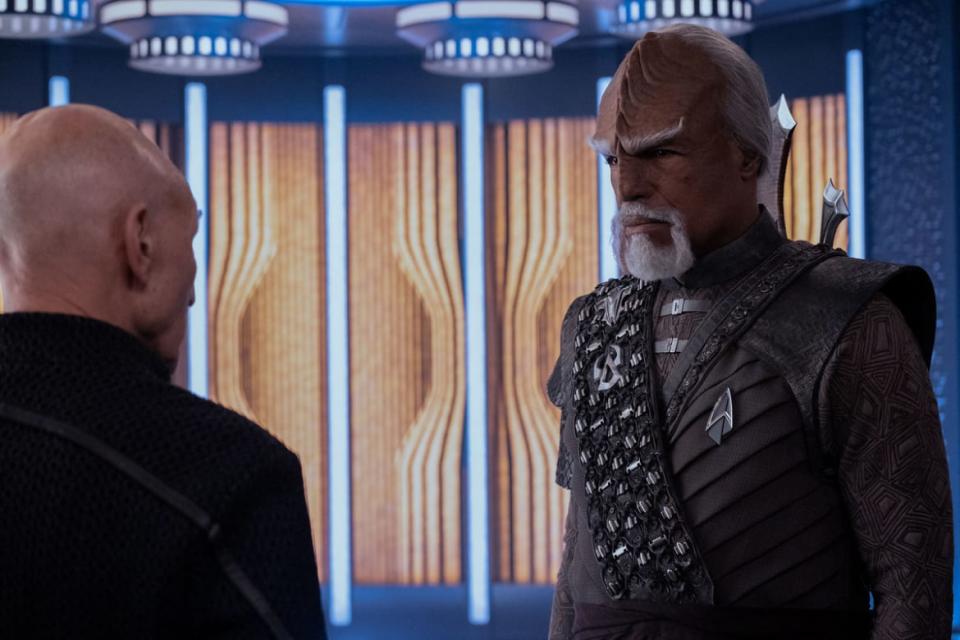‘Star Trek: Picard’ Boldly Goes Where We’ve Already Gone Before—For the Better

When Sir Patrick Stewart first signed on to revive his iconic character, Jean-Luc Picard, for a new television series, he asked that it not be a The Next Generation (TNG) reunion series. “There was no reason for us to walk down memory lane,” he once said in an interview. Instead, the first season of Paramount+’s Star Trek: Picard focused on new characters, new storylines, and new adventures for the elderly hero. With the exception of cameos of fan-favorites sprinkled here and there, Picard Season 1 avoided stories involving the Enterprise crew, instead focusing on his life as an admiral to the Federation.
But things changed for the second season, which aired last spring. Picard began to reintroduce iconic TNG characters into the major storylines, including the omnipotent Q (John de Lancie), percipient Ten Forward barkeep Guinan (Whoopi Goldberg), and the menacing Borg Queen (Annie Wersching). The showrunners and Stewart realized it would be impossible to bring up Picard without mentioning The Next Generation, as they have become synonymous with each other in Star Trek history. It became inevitable that the show would have to revisit the rest of his past, including the main cast of TNG, as Picard’s story slowly comes to a close.

With the show’s third and final season, which premieres Feb. 16, Star Trek: Picard does just that, leaning into the entire Star Trek lore–not just that of TNG, but also The Original Series, Deep Space 9, and Voyager canon. The end result is a story that feels very fan-service filled with callbacks and inside jokes, while remaining captivating through its character-driven plots and intriguing storylines that are easy to follow along for fans of Picard, even for those who aren’t the most Trek-enthused.
Picking up following the events of the second season, a newly-retired Picard is living in his countryside family home in France, having finally found contentment in his romantic relationship with his Romulan former housekeeper Laris (Orla Brady). He is packing up his belongings and the many recognizable items from his many adventures (including the Ressikan flute), as he prepares to be Laris’ plus one on her diplomatic career on the Romulan planet Chaltok IV.
Laris double checks if Picard is ready to leave behind the place he called home and life away from Starfleet. In a very foretelling scene, she says, “A point comes in a man’s life when he looks to the past to define himself. Not just his future.” He responds, reassuringly, “I hope that’s not going to be me. I’m not a man who needs a legacy. I want a new adventure.”
Of course, the past does come back to haunt Picard, as he receives a distress call from his former Enterprise chief medical officer—and former lover—Dr. Beverly Crusher (Gates McFadden), who requests his help without involving Starfleet. Picard recruits Captain William Riker (Jonathan Frakes) to commandeer Riker’s former ship, the USS Titan, now under Captain Liam Shaw (Todd Stashwick), to save Beverly. Although Picard is a legendary hero who has repeatedly saved the galaxy, not everyone is eager to assist in Picard and Riker’s intrepid plans.
Shaw knocks the admiral and captain down a few pegs by denying their requests for the safety of his crew and their mission.(“We won’t be blowing things up, engaging in fire, crash landing expectantly or unexpectantly,” Shaw tells them. “You know, the usual for you boys.”) There’s some sort of satisfaction in having their history of reckless righteousness called out, because it’s true. This isn’t the Enterprise. Picard and Riker are not the captains of this ship.
But there wouldn’t be a Star Trek story without someone disobeying orders. With the help from Shaw’s first officer, Seven (Jeri Ryan), Picard and Riker are able to rescue Beverly and her mysterious medical companion (Ed Speelers). But that’s not the end of it; whatever was trying to capture them is still out there and is targeting everyone from Picard’s past. He realizes that he must recruit new and old allies to figure out what exactly the enemies may want with him.

Showrunner–and certified Star Trek fanboy–Terry Matalas doesn’t miss a beat when it comes to the Trek mythos, ensuring everything is lined up when the TNG characters are reintroduced. Riker, Beverly, Worf (Michael Dorn), and Geordie (LeVar Burton) are given their moments to update Picard (and the audience) on their time post-TNG. It has been over 20 years since the crew were all together, giving them time to reflect on the experiences aboard the Enterprise, including their perception of “the great” Picard, which makes us question how much we really knew about the highly regarded captain. His actions are scrutinized throughout the season, especially in one heartbreaking scene where a fan-favorite character criticizes Picard’s sense of duty over morality–leading Picard to doubt his past judgements.
Like the previous seasons, Matalas and his team of writers excel at bringing depth and well thought-out development to the heroes of Trek. Although Seven and Raffi (Michelle Hurd) were given a happy ending at the end of last season, Season 3 finds them estranged with Raffi now working in Starfleet special op missions. The break up seems to have been detrimental to Raffi’s psyche as she puts all her energy and attention into her work. Raffi, a former addict, becomes obsessed with solving a deadly conspiracy and begins to descend into paranoia, walking a fine line on her sobriety. The series doesn’t forget the struggles that former addicts deal with on a daily basis, and it shouldn’t. Addiction is real and, in Raffi’s case, a demon she must grapple with to move forward.
Jeri Ryan Is a ‘Star Trek’ Icon—and One of the Most Important Political Figures of Our Time
Meanwhile, the new castmates are wonderful additions, including Geordie’s pilot daughter Alana (played by Burton’s real-life daughter, Mica Burton) and the austere Captain Shaw. Stashwick is notably charismatic as the antagonistic authoritarian who doesn’t take bullshit from anyone, including the beloved Picard, especially as we continue to learn the reasoning for his brash tactics. Though he serves as an obstacle for Picard, Stashwick imbues Shaw with much-needed empathy and humor. In fact, the entire USS Titan main crew have such palpable chemistry, it’s almost as if the writers are paving the way for a possible spin-off for this new generation of officers. I, for one, would be thrilled with this.
Unfortunately, the same cannot be said of the villains. The main foe this season is Captain Vadic (Amanda Plummer), a mysterious-yet-baneful alien captain, who has set her sights on Picard and his old crewmates from the Enterprise. The casting of Plummer is an Easter egg itself, as her father, the late Christopher Plummer, also played an antagonist in Star Trek VI: The Undiscovered Country. However, like many of the villains in the Star Trek universe, Vadic is completely one-dimensional; she serves no other purpose than to attack and destroy anything connected to Picard no matter the circumstances for her nefarious cause. Even the minor side villains are rarely given any time to become actual characters, as the heroes quickly dispose of them. This happens even to the ones with interesting backstories, like a Vulcan who becomes a crime boss because it seemed “logical.”
However, this is all so that we can remain focused on our central hero: Picard. The entire series has aimed to break down the character, going beyond the surface of an aging hero. The first season explored Picard’s mortality and the limits of what he could do with his slowly deteriorating body. Of course, he is given a second chance, when his consciousness is transferred into a synthetic body, but it only prolongs his life just a few more years—or, at least, two more seasons.

Season 2 dealt with Picard’s family trauma and how overcoming it allowed him to fully embrace life and find love. And with this final season (though Stewart did say he could return), the spotlight has been on his legacy and whether or not, through it all, it was all worth it. When asked by cadets inspired by him over the years if he ever wanted a life or family outside of Starfleet, Picard tells them that Starfleet has been the only family he has ever needed. Yet there seems to be some sort of remorse in his eyes, as he reflects upon his answer.
Picard may have been a great man, but he is still just a man, flaws and all. In its final season, the series beautifully captures his thematic journey while also sprinkling in some welcome, but not oppressive, fan service. Star Trek: Picard’s is triumphant in giving this iconic Star Trek hero a fitting conclusion to his decades-long story—while also potentially setting up a legacy for the next generation.
Get the Daily Beast's biggest scoops and scandals delivered right to your inbox. Sign up now.
Stay informed and gain unlimited access to the Daily Beast's unmatched reporting. Subscribe now.

 Yahoo News
Yahoo News 
